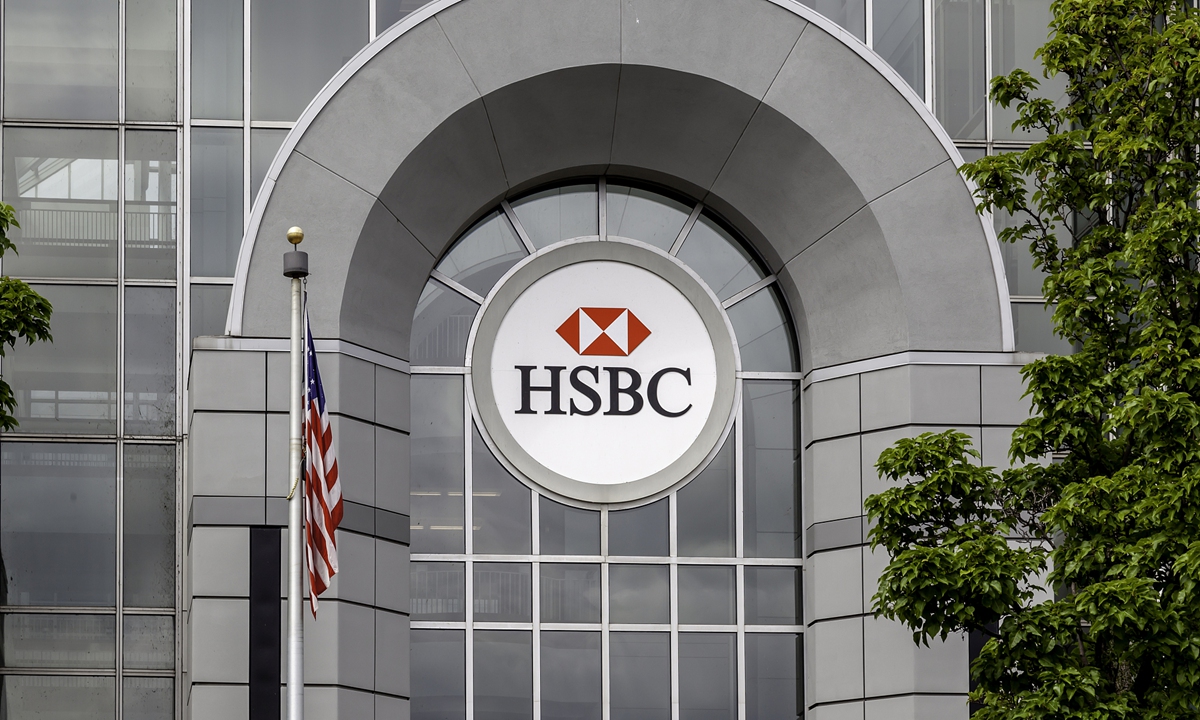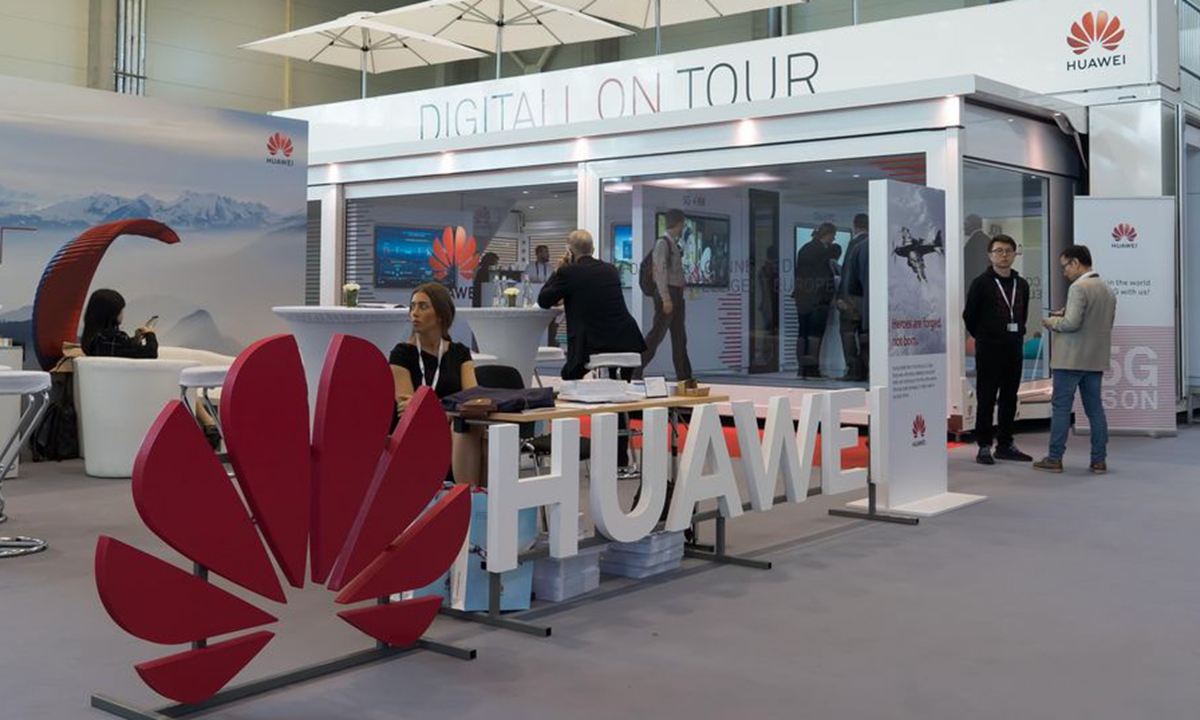HSBC not innocent in ‘betrayal’ of Huawei
By Shen Weiduo and Chen Qingqing Source:Global Times Published: 2020/6/12 23:58:40
US long-arm jurisdiction, hegemonic game disrupt world business order

HSBC Photo:VCG
The US, which has abused the so-called long-arm jurisdiction power to arbitrarily crack down on any third party, such as Huawei, and forced others to be an "accomplice" during its hegemonic game, is increasingly becoming a major troublemaker for other countries and the world business order, sources said, adding that those who yield to the US, like HSBC, and unwisely choose sides also need to be blamed and should not claim innocence.
Observers said HSBC is more like the then-French multinational Alstom, which sold its energy division to General Electric over a US investigation. As Huawei still stands tall after being suppressed by the US for over a year, the bank chose to fall on US knees amid sanctions.
The US is using the case of a senior Chinese telecoms executive arrested in Vancouver on a US warrant 18 months ago to create friction between China and Canada, said Cong Peiwu, a Chinese envoy to Ottawa, Reuters reported on Thursday.
"The US has been taking advantage of Canada, and is the troublemaker of China-Canada relations. We believe this is a grave political incident plotted by the US to bring down Chinese hi-tech companies," the ambassador said.
The remarks come as the latest ruling from a Canadian court has kept Huawei Chief Financial Officer Meng Wanzhou, who was arrested by Canadian police at the request of US in December 2018, under detention.
While describing Canada's ruling as completely surrendering its self-proclaimed judicial and diplomatic independence to US bullying, legal experts and media also found that previous legal documents indicate that HSBC, the London-headquartered multinational bank, set a trap for Meng's probe as it had its own issues in the face of US sanctions.

Photo taken on Nov. 20, 2019 shows Huawei's exhibition booth during a press preview for the 2019 World 5G Convention in Beijing, capital of China.(Xinhua/Li Xin)
American trap?
Legal documents posted on the official website of the US Department of Justice (DoJ) on January 24, 2019 show that Meng had an in-person meeting, which took place on August 22, 2013, with HSBC - referred to as Financial Institution 1 executive in the document. During the meeting, Meng spoke in Chinese, relying in part on a PowerPoint presentation written in Chinese. Upon HSBC's request, Meng arranged for an English-language version of the presentation to be delivered to HSBC.
The presentation - which was later handed over to the DoJ by HSBC, and which the DoJ alleges contained "numerous misrepresentations" - played a key role in the US charges against Meng.
Meanwhile, HSBC was also trapped in a money laundering case in Mexico that has become a dark chapter in the company's history, which also permitted the DoJ to appoint an independent monitor to supervise its process of compliance.
A source familiar with the bank who prefers not to be identified told the Global Times HSBC did not intentionally leak the information to the DoJ on Huawei's business with Iran, but yielded to US legal pressure. "The bank had no choice but to follow the legal obligation to provide information to the DoJ," the source said.
Nevertheless, people familiar with the case told the Global Times it is not even true to depict HSBC as a victim of the China-US battle or Washington's long-arm jurisdiction, as its then deputy head of global banking for the Asia-Pacific region, Alan Thomas, who had provided crucial "evidence" to the US side that served as numerous misrepresentations in the case against Meng, had not been coerced by the DOJ but represented a deliberate coordination with the US government.
In such a case, the bank could be considered an "agent" of the US government to do the dirty work to guarantee its "safety," a source close to the matter said, adding that such behavior of putting itself into a geopolitical battle has created its own problems.
HSBC may be a victim of US long-arm jurisdiction, but it has a choice when facing pressure from the US, and should not claim to be a "victim" in Huawei's case, Shen Yi, the director of the Research Center for Cyberspace Governance at Fudan University, told the Global Times on Friday.
Those who unwisely chose sides and believe that they could "lean on the big tree for shade" will face sanctions and a loss of reputation when doing business hereafter, experts said.
Faced with growing controversy over the legal battle with Huawei and a lingering ambiguous attitude toward Hong Kong's national security law, HSBC has been under tremendous pressure in recent days, and is "far from safe" in China, some Chinese observers said.
The bank is now stuck in the middle of the escalating confrontation between China and the US over not only Huawei but also Hong Kong. Its belated stance on the upcoming national security law for the Hong Kong Special Administrative Region (SAR) drew a backlash from Chinese, in addition to keeping an account for an online fundraising platform that raises money for illegal protesters, which have shaped its controversial history with the Chinese market.
Former Hong Kong chief executive Leung Chun-yan also recently said that since HSBC profits mainly come from China, the self-proclaimed British bank can't make money from China while following Western countries in doing things that damage China's sovereignty, dignity or offend its citizens' feelings.
A former senior executive from the bank, who appeared to be a victim in the China-US clash, told the Financial Times in a recent interview that "we have fallen off the tightrope." However, insiders close to the matter said the unprecedented pressure that the HSBC faces and its struggles all come from US economic bullying and hegemony and its decision to choose sides in geopolitical games.
"If countries and firms just allow the US to continue to abuse its power and not settle the problem, it's just a matter of time for anyone to become a victim," Shen said.
Who is coercing others?
Experts also called firms and countries to safeguard the rule-based business order and not become the next pawn of US hegemony. If the US is allowed to abuse its power without any boundaries, it will just be a matter of time before everyone ends up a victim.
US Secretary of State Mike Pompeo on Tuesday criticized HSBC for its announced support of China's national security legislation for Hong Kong, saying it is a "show of fealty" which has earned the bank "little respect" in Beijing. He also said that the US stands ready to help Britain with alternatives, and stands with its allies and partners against "the Chinese Communist Party's coercive bullying tactics."
However, the latest anecdotes either from the Huawei-HSBC legal case or Hong Kong matter also raised a new question about which country bullies others and puts companies in difficult situations, hurts the business environment and destroys hard-won trust.
The US is not only abusing its long-arm jurisdiction, but is also abusing the dominance it has accumulated in the economic and technology sectors, Mei Xinyu, an expert close to China's commerce ministry, told the Global Times on Friday.
"If the US continues to play the hegemony game, it is also forcing more countries and firms to follow business ethics and rules rather than bowing to its pressure to safeguard a normal global business order. That means 'de-Americanization' will become a worldwide campaign," Mei said.